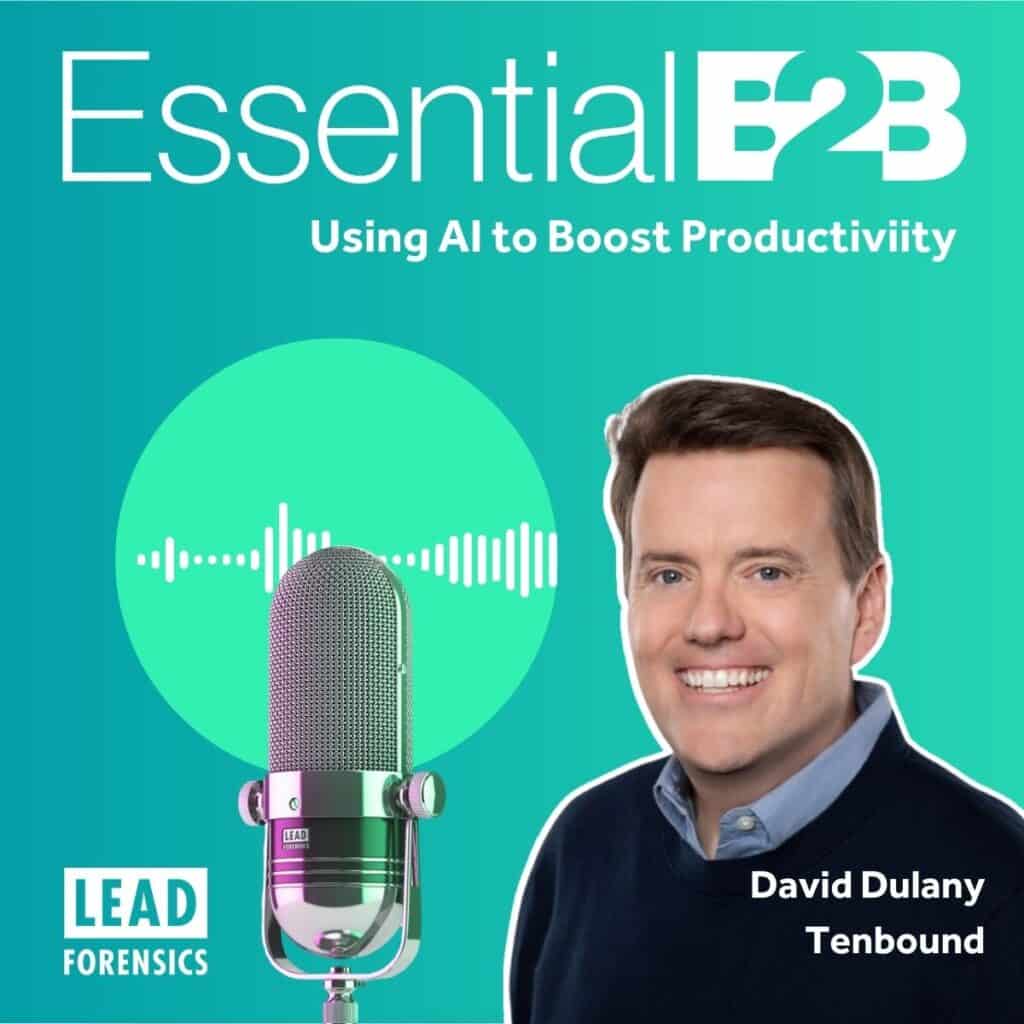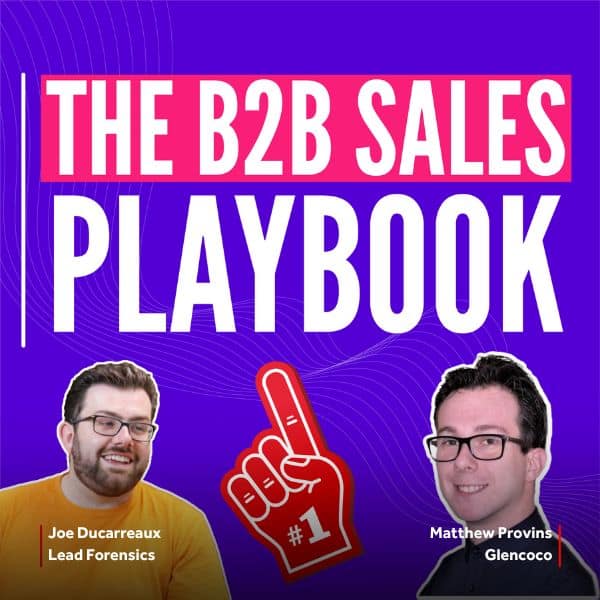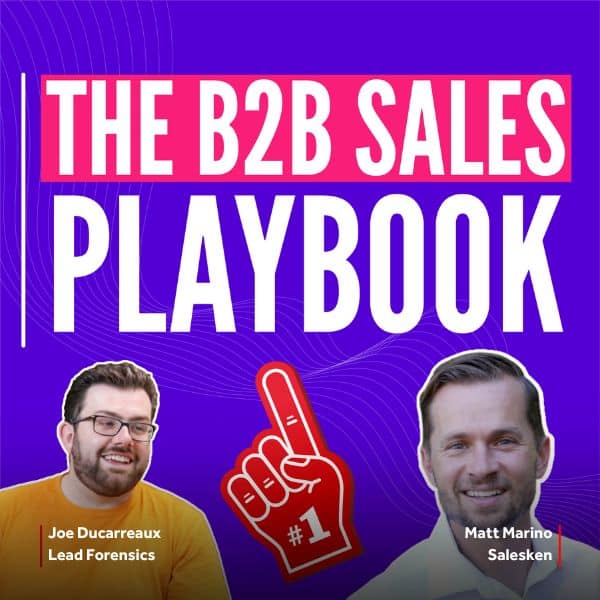Serving Others in B2B Sales
This episode of Essential B2B features a conversation with Michael Hanson, CEO of Growth Genie and host of The Cosmic Bridge podcast. Michael and Joe already had a conversation around mental health on the B2B Sales Playbook podcast, so it was a pleasure to get to know Michael a little bit better on Essential B2B. It's a thought-provoker this one, so please enjoy!
Related Podcasts



Transcript
Joe: Hello and welcome to the Essential B2B podcast brought to you as ever by Lead Forensics. I’m your host, Joe Ducarreaux and for this episode I was joined by Michael Hanson, Founder and CEO at Growth Genie and co-host of the Cosmic Bridge podcast.
Michael recently joined me on the B2B Playbook podcast to discuss protecting your mental health while working in sales, which I hugely recommend you go and check out. So I was delighted when he agreed to answer my Essential B2B questionnaire.
So without further ado, here is Michael Hanson on the Essential B2B podcast.
Joe: Michael what do you love about your industry and is there anything you would change about it?
Michael: Good question. I’ve always liked working in sales and now being a sales consultant and sales trainer. It’s because it helped me be a better communicator, so that’s my ‘Why’ like working in sales.
I feel like a lot of problems in the work are related to people not communicating properly whether it’s politicians or people getting divorced or a lot of wars have started due to bad communication. I think communicating, finding common ground that’s really all sales is about so it’s helped me be a better communicator which has helped me with my friends, my family, etc.
Now we are helping other salespeople because I help them be better communicators. They tell us the same things, oh it’s helped me in other aspects of my life as well. Then there is also that grit and determination that sales gives you because as you will know, and a lot of people listening to this will relate, people are not going to respond first time. Even if you closed 30% of your deals, that’s a good close rate so it means you’re getting rejected 70% of the time.
It’s helped me be a better communicator and it’s helped me have more determination. I think the thing that is difficult about sales….. and I’m one of those people, like most salespeople, I was at university and I wanted to work in sales. I was probably the same as most people before I got into sales, saw sales as like this sleazy profession. It’s interesting because I do think there are some salespeople out there that do just want to make a quick buck and will sell a deal even if it’s not in the person’s best interest. But my experience has been, most salespeople do honour truth and integrity.
On my podcast, Cosmic Bridge, we interview sales leaders but we don’t talk about sales. Often these really successful salespeople have a big family life or a spiritual aspect behind them. One the spiritual side of it but even the material side of it, if you really want to make big money in sales and have big customers who come back to you again and again, they have to be people who trust you and think you’re honest. So what I don’t like about sales is the reputation that salespeople have but I think it’s really just for those select few people who work in sales who were in it for everyone else. I think most salespeople do value trust and integrity.
Joe: I think you are absolutely right. It’s a consistent theme with the Essential B2B podcast that people buy from people. If you can foster that trust and that rapport then people will keep coming back to you. More so as you say the people in it to get in make a few quid and get out.
This can be personal or professional, Michael. What would you say is your greatest achievement?
Michael: Oh ah!
Joe: It’s a big one!
Michael: I don’t think anyone’s ever asked me that question before so I may need a moment to think about that. I’ve run three marathons so I remember when I first did it that felt like a big achievement. I feel that’s a little bit like a superficial achievement. This is a bit of a vague answer I would give and I think it’s helped me a lot in sales and again related to some of the best salespeople I’ve met are quite a lot into psychology. A concept that helped me a lot, is a concept that a psychologist called Carl Jung talked about which is called The Shadow. Essentially, it’s all of us have inside of this shadow, a darkness that isn’t aligned to the higher self that we are striving for. I think going through that journey and realising some of the things wrong with me was very transformational for me and it helped me come out of the ‘victimhood’ mindset. Again, thinking that life’s not happening to me but life is happening for me and there’s a reason interconnecting us behind everything.
So I guess I am more happy with that journey in my life that I’ve had in recognising my own faults versus trying to project blame onto others. Which I think happens a lot unfortunately with something like the social media world that we’re living in.
Something very specific would be running a marathon but something a bit more of just generally in my life is analysing myself and looking at my own shadow.
Joe: Again, one foot in the spiritual, one in the physical. Which is entirely what the Cosmic Bridge is all about. What motivates you Michael, what gets you out of bed every morning?
Michael: It’s related to the first question you asked me: how can people be better communicators? My 20 year old self at university in Nottingham would have been like sales training, that’s super corporate, that’s boring.
Now, it’s just helping people be better communicators and from a material perspective, getting renewals from clients and big contracts and all that kind of stuff means I can grow the business and pay people, that’s great! But really what drives me are the messages from individual salespeople I work with. You’ve changed my career and I’ve been promoted, I am now a manager or a VP. I’m really happy and my wife is saying I’m like a different person.
All those types of things are really what keeps me going. And again I feel a lot of it really in sales is just down to becoming a better communicator, like I said earlier. We’ve already helped around 1,000 or more salespeople and if we can continue that to tens of thousands or millions, that’s really what keeps me going.
Joe: Absolutely. I can see why that’s an entirely motivating fact for you. To step away from work slightly then, how do you decompress from your work, Michael? And how important is that divide between work and personal life for you?
Michael: I did see something recently which I quite liked. Work/life integration versus work/life balance. I do think it’s important that you don’t work 100 hours a week. I probably work more than the average employee of a company doing 40 hour weeks. But I try not to do more than 50-60 hours a week. I know there are entrepreneurs that are switched on all the time. But I’d say I’ve got a pretty good work/life integration and balance and I actually think the two things are interconnected. Because I think it’s often thought that you have to work 100 hours to be successful, which I think is rubbish. It’s the whole work smarter not harder thing.
The other tactics we talked about on the other podcast, like exercise, I find really helps me. Playing football, playing tennis to more of a solo thing like running or doing weights in the gym. Breathwork is something I’ve got into. There’s this thing called holotropic breathwork. I would advise people to look it up, you can look into that.
Just spending time with loved ones and family, that’s really important. I always thought I didn’t need other people to be sane. Even though I have my extrovert side in sales, people who know me know I have a big introvert side as well. I just like to be by myself sometimes. I still need that alone time from time to time but during the pandemic and lockdown, I realised that okay shit, I do need social connection and social interaction. My parents live in London so I see them all the time. I lived abroad for three years so it’s great to hang out with them. Then my partner and my friends, I think feeding off of other peoples’ energy is important for me.
Joe: Do you have a recommendation for a sales book for our audience, at all?
Michael: I’m going to be a bit leftfield here and recommend…..I’ll give you one sales book and recommend Dale Carnegie, How to win friends and influence people and I like it because it’s really about how we can communicate better. So it’s not sales, it’s about having better relationships with people. The other one I will give you, this is actually the guy who came up with holotropic breathwork. There are many different types of breathing. It’s called the Cosmic Game by Stanislav Grof. I really liked that because it made me do a lot of self reflections, like I was talking about the shadow earlier. That book changed my life in a lot of ways. So I really recommend reading that.
We were talking about spirituality earlier. The problem with spirituality is it’s very difficult to put it into words, that’s like the whole point of it. But Stanislov Grof does a really good job of doing that. That was a super transformational book for me. I read that just before I set up my business and I don’t think it’s a coincidence that a lot of things went well after that.
Joe: Based on the conversation that we’ve just had, Michael, what one top tip would you like to offer the audience of the Essential B2B podcast?
Michael: I think, this can be a tactic for both sale and non sales and that’s give before you take. So that’s always what we say. I think in sales and again I think this goes back to the negative reputation of salespeople, salespeople are always trying to take. So always think about what you can give. I notice this about your company and this about you on Linkedin, would you be interested in this piece of content that could help with that. If they say yes, then you can start a conversation. You’ve got off on that foot of the rule of reciprocity and then it’s much easier to start the sales conversation with them and then even once you’ve got someone in a conversation and you’re making a deal, think about what you can give them. If they are hiring someone, can you make introductions? Even things outside of sales, I sell a lot to Americans and sometimes they come to London and as well as meeting them for coffee I will give them tips about where they should go in London. So think what can you give in life, how can you serve others and then naturally the abundance will come back to you. That’s just the way the universe works.
Joe: Michael Hanson, thank you for joining me for the Essential B2B podcast.
Michael: I appreciate it, Joe.
Well there you go, Michael Hanson joining me on the Essential B2B podcast. Remember to subscribe to the Essential B2B podcast wherever you get your podcasts and rate us 5 stars where available. We’ll be back next week with another brilliant episode of Essential B2B.


